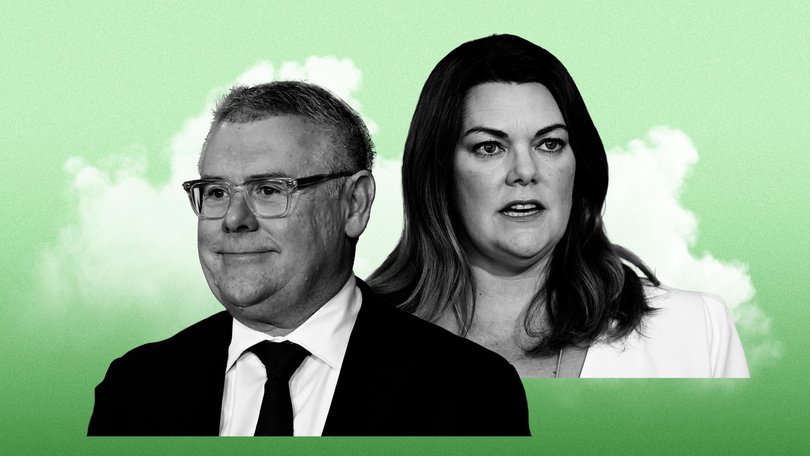JASON FALINSKI: Don’t blame the Liberal Party, big business was too timid to fight anti-gas environmental laws

The Greens’ success in amending the Environment Protection and Biodiversity Conversation Act exposes they’re playing politics in the 2020s while corporate Australia is stuck lobbying like its the 1990s.
On Friday the Prime Minister stood in his courtyard and announced he’d inked a deal with the Greens to pass EPBC reform.
For weeks Environment Minister Murray Watt was openly playing a “will he, won’t he” game with both the Coalition and the Greens.
Sign up to The Nightly's newsletters.
Get the first look at the digital newspaper, curated daily stories and breaking headlines delivered to your inbox.
By continuing you agree to our Terms and Privacy Policy.The business community made it clear they wanted a deal between Labor and the Coalition because the Coalition was pushing for loosely the same amendments business wanted.
But Labor secured a deal with the Greens after they either blinked, or decided to be more pragmatic post-Adam Bandt.
With the Bill now passed, the Business Council said it was a “missed opportunity”. The Minerals Council said it was an “inferior and disappointing outcome which fails to strike the right balance”.
The Australian Energy Producers said it “will entrench slow approvals will drive up energy costs, deter investment and further delay new gas supply”.
Whether the Coalition was outfoxed or held out isn’t clear. But there is one group who was certainly outfoxed: corporate Australia.
For those in corporate Australia wondering why they have lost, it is quite simple: politics has changed, but your approach has not.
Since the 1990s corporates could go to Canberra locked in arms with lobbyists and get a reasonable hearing from mostly Coalition governments.
If they didn’t get their way they could apply a bit of pressure through mainstream media with articles reporting data they commissioned to shape the public conversation.
They’d generally find a sympathetic ear in the minister’s office, and if not there were pathways through the backbench or a ginger group.
Even under Labor governments it normally wasn’t too hard. Earlier generations of Labor politicians came from blue collar industries and understood wealth creation was needed before redistribution.
Those days are over.
The era of lobbying, broadcast media and ideology is gone, and has been replaced by an age of democracy, social media and narratives.
Business hasn’t adjusted. Their opponents have.
Corporate Australia’s opponents now invest in framing business up as the villain in a public narrative before it has even registered with their head of public affairs.
It won’t be picked up in media monitoring because a lot of it is below the radar through investment in social media repeaters who become the “authentic” channel to deliver messages, and the infrastructure to unpack the inevitable response.
By the time business turns up to Canberra to try to influence politicians, they’ve already lost.
The hands of politicians are largely tied into going along, even if they privately concede that they’d prefer the solution were otherwise.
Most politicians face a choice to either fight for business and lose their job, or fight voters and lose future public revenue.
It’s a pretty easy choice, especially when business rarely attacks with bite and does not turn up at the ballot box.
Once big businesses loses, they tend to retreat to their headquarters resigned to defeat but lacking the willingness to invest to ensure the situation is not repeated.
Meanwhile, the unions are constantly investing in their campaign infrastructure on industrial relations. Business doesn’t. Green groups are doing the same to stop project approvals. Corporates don’t.
On industrial relations, Labor is elated industry is slack. On environmental issues they become the centre group between the pro-development Coalition and the anti-development Greens.
In both scenarios Labor can win, and corporate Australia almost certainly loses.
If you want a friend you have got to be a friend, and when you aren’t you lose friends.
So while the unions will fight for themselves, their members, and for Labor; corporates and industry groups rarely campaign for themselves, sit in judgment of the Coalition, expect them to pick up the cudgels, but won’t campaign for them.
Meanwhile corporates will fall over themselves to applaud technocratic teal pontifications that pass the wine bar test, but never the pub test.
More importantly, if you want the government or opposition to listen to you, you have to be mindful of the consequences if they don’t.
Currently the arms of the progressive-left movement have built the infrastructure to threaten politicians with electoral defeat if they don’t get their way. Corporates can only threaten them with fewer meetings.
For all of corporate Australia’s talk of embracing innovation, they haven’t applied it to their own influence over the public, while their competitor interests in public policy have. As in business, don’t be surprised you need to adapt or die.
Jason Falinski is the former Liberal member for Mackellar and former NSW party president
